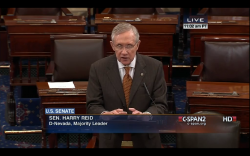It's April Fools Day, but there is no joke in the Senate. The U.S. Senate voted to pass the Protecting Access to Medicare Act of 2014, which both pushes back the compliance deadline for ICD-10 and perseveres the pay rate for doctors treating Medicare patients. Senators moved the bill along by a vote of 64 to 35.
As was the case in the House hearing last Thursday members of Congress spoke passionately about how problematic the bill and the process of cramming it through have been.
“We need to restore sanity to the Medicare payment system,” said Majority Leader Harry Reid, D-NV, at the beginning of the debate. “The fact remains this legislation is not perfect, it’s not ideal.”
Later, Sen. Orrin Hatch, R-Utah, added: “I’m not going to make the perfect the enemy of the good. I plan to vote in favor of the SGR bill today.”
Hatch, as it turned out, was in the majority. Whereas the provision to delay ICD-10 may go largely unnoticed in the general citizenry, it isparked something of an uproar in the healthcare realm — where the code set conversion is among the most contentious issues.
“This idea of bundling a ‘bad thing’ with a ‘good thing’ in a bill that is sure to pass because of the ‘good thing’ is sort of crazy,” said healthcare technology consultant Steve Sisko.
Joe Lavelle, founder of Results First Consulting, which works with healthcare systems, added that “the way the vote went clearly indicates to me that back door, big-time political forces are at work.”
On Monday the American Health Information Management Association took to Twitter with the #NoDelay hashtag, calling on senators including Sens. Reid and Ron Wyden, D-Ore., who by virtue of taking over the Senate Finance Committee 16 days ago found himself at the center of the feisty debate, to vote down the bill or pull out the ICD-10 provision.
Lavelle said that among his clients the payers and most health systems would have been ready by Oct. 1, 2014 and that they will take advantage of the extra year, particularly for testing and dual-coding.
“We will not slow down this time — lesson clearly learned last time,” Lavelle added.
Lavelle estimated that another yearlong delay will cost his clients anywhere from $500,000 to $3 million each, depending primarily on the organization’s size.
“If we simply delay without addressing the reasons for delay (procrastination, lack of testing, etc),” Lavelle explained, “then we will be back in the same place next year.”
The bill also serves as the 17th patch of the so-called “doc fix” or SGR, which was the overriding reason for the heated debate Monday afternoon. SGR is the rate that the Centers for Medicare & Medicaid Services pays physicians for treating Medicare patients. The rate of pay was slated for a 24 percent reduction effective April 1. By passing this bill, the Senate voted to postpone that reduction for another 12 months.
“Parties could not come to agreement on what a permanent [SGR] fix should be,” Sen. Reid explained. And he represented what just about every senator who spoke Monday said when he added, “I hope it’s our last patch.”
From the Healthcare IT News article written by Tom Sullivan, Editor, Government Health IT

